Very Few Croatian Workers at Country's Construction Sites
June the 11th, 2022 - Croatian workers at construction sites up and down the country are becoming a rarer and rarer sight with imported labour now the forced choice of many as the demographic crisis makes Croatian workers illusive.
As Ana Blaskovic/Poslovni Dnevnik writes, the rise of the property market has gained additional momentum with continued inflation, and the dynamics of price growth are increasingly causing disbelief. Buyers and sellers are wondering how long this will go on for, each from their own angle calculating the optimal time to sign a contract, and experts warn that problems are still accumulating.
Builders can hardly plan at a time when the prices and availability of materials are rampant, the state doesn't have an adequate housing policy and housing affordability is becoming a luxury for locals while apartment and short-term rentals are booming. All of the above could be heard at the recently held round table called: ''Challenges and opportunities in the real estate market'' organised by the well known Njuskalo portal under the moderation of Robert Pokrovac from Erste Real Estate.
"The public is increasingly realising that we have two real estate markets. One is based on tourism, where projects aren't bought from a salary, but investors are focused on high-income buyers and foreigners, and the other is the lack of housing market for those people who live on Croatian wages,'' said Josip Tica, professor at the Faculty of Economics in Zagreb.
Deficient policies
"Existing business models haven't yet adapted to this duality, and the state lacks public policies that would focus on solving this problem. In the real estate market, it can often be heard that developers and investors are talking about a recession, but I don't see a reversal of the cycle, only the existing model has come to an end. Projects are created two years before the ‘first shovel’ takes to the ground, so with inflation and current prices, it's necessary to exchange data as well as possible. Inflation can end in either recession or monetary restriction and economic slowdown,'' Tica said.
He added that in a situation when the country is perceived as attractive, and in which, due to tourism, foreign buyers have more purchasing power to influence real estate prices, there is a need to deal with the market where the domicile population will live, not just foreigners coming to Croatia.
Builders are plagued by a range of problems, from labour shortages to galloping raw material costs, and many have underestimated the dramatic jump in residential demand since the 2008 crisis, explaining the chronic shortage of current supply. For example, once between eight and nine thousand apartments were built in Zagreb, today the number is three times lower. The founder and procurator of Kamgrad, Dragutin Kamenski, pointed out that after joining the EU, this situation with the labour force was expected, and the local population is less and less tied to such occupations.
"It's not easy, but we're solving these challenges. Bringing foreigners in and having them work on sites instead of Croatian workers requires exceptional commitment to bring them into the system, people come to you who don't have the skills, they have a language barrier, you have to solve the issue of accommodation, food… At one point, we introduced about 200 workers into the system, which is why our productivity dropped by 30 percent with an increase in other costs, which is our reality in Croatia. I'll put it like this; On December the 31st, 2016, we had no foreign workers doing this, today we have almost no Croatian workers,'' he said, illustrating the daily struggles faced by this industry.
He believes that programmes should be made so that everyone in the construction sector can prepare for things on time and plan their capacities, because, otherwise, tenders will be announced in which no one will have the conditions to apply at all.
Although the domestic brokerage market is well regulated, even better than in some other European countries, current times are demanding, according to Dubravko Ranilovic from the real estate agency Kastel-Zagreb.
“Now is the time for sellers, we have an upward cycle and inflation. Our market is small, it's mostly under external influences, although it's also shaped by local conditions such as earthquakes and tourism. Intermediaries need to be accountable for how realistic they're being in their estimates and refer clients, and not just act for short-term earnings. At the same time, the media are communicating the requested prices, so it takes six to eight months for the owner to correct those (too) high prices, and agencies often tell apartment owners what they want to hear, which accelerates the growth of that same bubble,'' warned Ranilovic.
He believes that there is too little talk about the necessity of adopting a proper housing policy, although the current model of the real estate market in Croatia is unsustainable because housing is of course a necessity. The state strengthened the construction of apartments with preferential tax treatment, which expanded to residential areas, taking away part of that space in favour of short-term rentals, and then further aggravated the situation with subsidies. On top of that, the earthquakes of 2020 revealed that the existing housing stock is very poorly maintained, building tenants often don't even consider their chimneys, facades or roofs to be a problem, and that's something that desperately needs to alter.
For more, make sure to check out our dedicated business section.
Conference Held on Untapped Slavonian Potential, Green/Digital Transition
June the 11th, 2022 - A recently held conference discussed untapped Slavonian potential, looking more deeply into this wrongly overlooked part of the country and exploring what the green and digital transition(s) could mean for it.
As Poslovni Dnevnik writes, the Agency for Sustainable Development of the Municipality of Antunovac held a conference on untapped Slavonian potential, organised by the International Network of Business Women and the Croatian Association of Employers of the Osijek Regional Office.
"This is a fantastic topic for Slavonia, but also for Croatia in general, because a lot of funds will be available. Digitalisation and the green transition is something that awaits us in the future and without which we can't move forward. Neither big nor small enterprises can turn a blind eye to this, because without it they won't be competitive and that's something they'll simply have to introduce,'' said Ivana Radic, President of the International Business Women's Network.
Milan Peterka, head of the Centre for Entrepreneurship, added that in addition to the tenders from the National Recovery and Resilience Plan, for digitalisation and the green transition, it will be possible to withdraw funds from the European Union's multiannual financial framework 2021-2027, and as much as 7 billion kuna will be available.
The conference focused on two main topics: the green transition and digitalisation, as these are increasingly current topics that the European Commission has also emphasised in the new budget period. Here in Croatia, only 15% of business entities use green technology and we're still very much lagging behind in terms of the degree of digitalisation. Croatian companies are insufficiently prepared and insufficiently informed.
“The green transition is a strategic decision of every company and it's a process that requires a lot of financial resources, depending on the industry in question. If we talk, for example, about the chemical industry, those funds can be very significant,'' explained Mirjana Samardzic Novoselec.
She also referred to the recent research conducted by Apsolon related to digitalisation, in which Croatian companies continue to make insufficient use of digital technologies. "The coronavirus pandemic has pushed some processes forward, but this still isn't enough,'' he said.
However, there are some good examples of digitalisation and the green transition among businesses in Croatia. Blazenka Cisko Anic, the director of the Saponia Institute d.d., also spoke at the conference, at which she announced that in the coming period, Saponia plans to invest 20 million kuna in increasing its energy efficiency by using green energy through the installation of solar panels and the energy renovation of six production facilities and the company's headquarters.
"Saponia has long since recognised the need for a green transition and for products that are environmentally friendly. Within Saponia, great care is taken of the raw materials that are purchased, the production process and standards,'' said Cisko Anic.
On behalf of the Olimpias Group, their Wasatex project was presented, which enables water savings in the fabric production process, where 70 percent of the water is reused in the production process. The investment is worth a massive 1.2 million euros, half of which was obtained from EU funds, and the return on investment is two years.
Zvonko Popovic, the director of Kanaan, said that part of their planned activities when it comes to the green transition has already been implemented by Kanaan, and the next step is robotisation.
"We've done perhaps the most in agriculture. We bought software that now makes it much easier to control the situation out in the fields. The new equipment we bought consumes a lot less resources, both in the human and energy senses. We've invested almost 10 million euros in robotics, which may not be the most popular thing, and our goal in the next two years is to robotise all possible drives. The reason is that there isn't enough manpower, and labour is becoming more expensive and the quality is declining. I must say that the only thing that pays off for the future is the purchase of state-of-the-art technology and to have adequate people who will follow it,'' stated Popovic.
PlantOn CEO Mario Salai explained how their company helps farmers on the one hand and customers on the other because it allows them to nurture their remote garden through the app.
“Anyone can enter our system, apply, get 40 square metres of their plot and process what the customer wants. It may be surprising that most of the current users are family farms and companies that want to produce organic and healthy fruit and vegetables for themselves or their employees,'' concluded Salai.
For more, make sure to check out our dedicated lifestyle section.
HZ Cargo Employs RailPRO System for Customer and Employee Savings
June the 11th, 2022 - The Croatian national railway carrier HZ Cargo has implemented the RailPRO system which digitises and modernises its business processes, which in turn enables savings and brings benefits for customers and employees alike.
As Poslovni Dnevnik writes, the RailPRO solution has been developed by a Croatian IT company, and HZ Cargo has the exclusive right to use it here in the country.
The key novelty of this new system is the ability to view the current situation on the ground in real time, so you know at any time where which train is, which cargo is being transported, in what quantities it is and how many possible delays along the way there could be. With such detailed real-time information, HZ Cargo points out, the optimal management of locomotives and wagons can be easily achieved. This results in a reduction in total costs and increases the availability of vehicles for additional work.
The shift towards digitalisation and cargo tracking has become more important than ever, especially given the transformation of global supply chains that has made logistics work more challenging than ever before, with increasing pressure to deliver faster and more flexible services at much more competitive prices. Freight tracking has become a key driver of digital innovations in the freight industry, and they're aware of this in HZ Cargo, which is the only one today to have this system implemented.
On the occasion of six months of the active implementation of the system, the director of HZ Cargo, Dragan Marcinko, pointed out that HZ Cargo is firmly following trends that put the importance of timely information and digitalisation of the entire business as paramount.
"Today's customers expect a high level of service - they want to know in real time where their cargo actually is, when it will arrive, and they want to follow each and every change on the cargo's planned route. This level of visibility will help boost HZ Cargo's overall competitiveness, and better monitoring could help return freight to rail. Today, our largest customers have an insight into the current traffic of trains and freight, they're provided with insight into all documentation, and this system actively contributes to the growth of labour productivity. All of this is in line with our strategic goal of modernising the entire business, increasing profitability and focusing on a modern way of doing business,'' explained Marcinko.
HZ Cargo currently has 66 of its own locomotives, the data of which are processed and analysed in real time, the system is currently being used by 900 employees and expansion is planned. GPS devices are installed in all active locomotives, as well as in the company's official cars.
For more, make sure to check out our dedicated business section.
Looking for Somewhere to Eat in Hvar Town this Summer? Don't Miss These 5 Spots
June 11, 2022 - If you're looking for the best places to eat in Hvar town this summer, Sunčani Hvar has you covered.
From captivating beach restaurants with sensational sea backdrops to hip rooftop dining with panoramic views of the city, Hvar really does have it all. The most popular hotel group on the island, Sunčani Hvar, has compiled a list of some of their favorite places to eat while spending time in Hvar town.
Beach Club Hvar
Dubbed as one of the hottest beach clubs in Europe, BCH is also one of the coolest places to eat in Hvar. Book your sunbed throughout the day and enjoy a signature cocktail right by the seaside. If you get hungry your table is just a few steps away in the central part of the restaurant area among stunning white stone colonnades. Discover carefully prepared Mediterranean delicacies, delicious salads, and original seafood entrees.
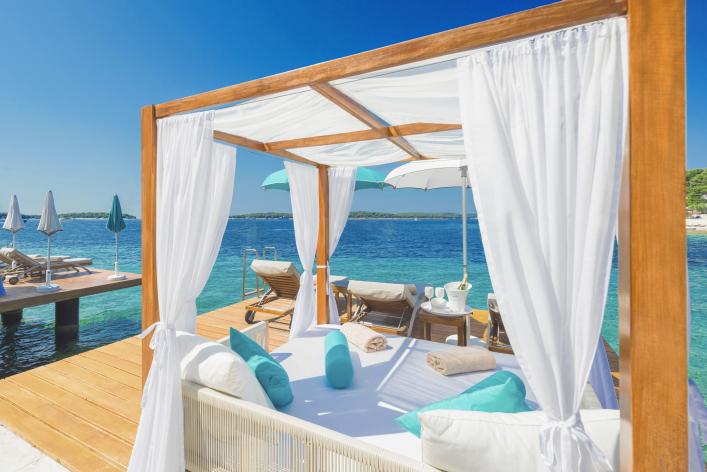
San Marco
Located at the 5-star heritage hotel Palace Elisabeth, San Marco is surely one of the best restaurants in Hvar. Perched on top of the hotel’s terrace, it boasts beautiful views of the main square and Hvar bay. Ideal for those who want to enjoy tasty Mediterranean cuisine with innovative and artfully presented dishes inspired by fresh, local products and aromas that together create a truly unique culinary experience.
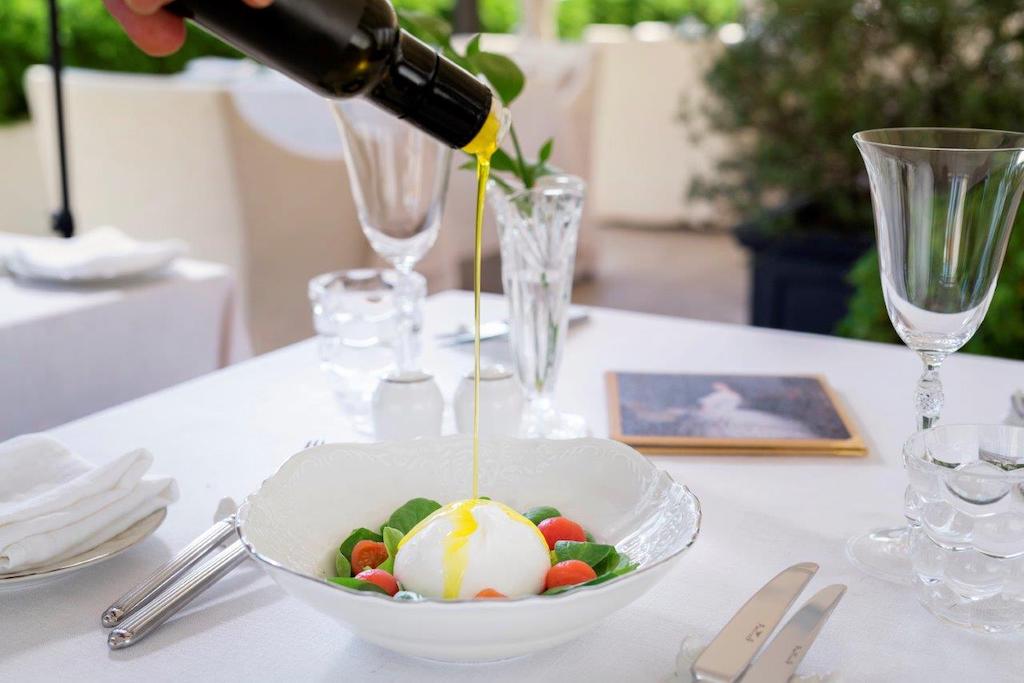

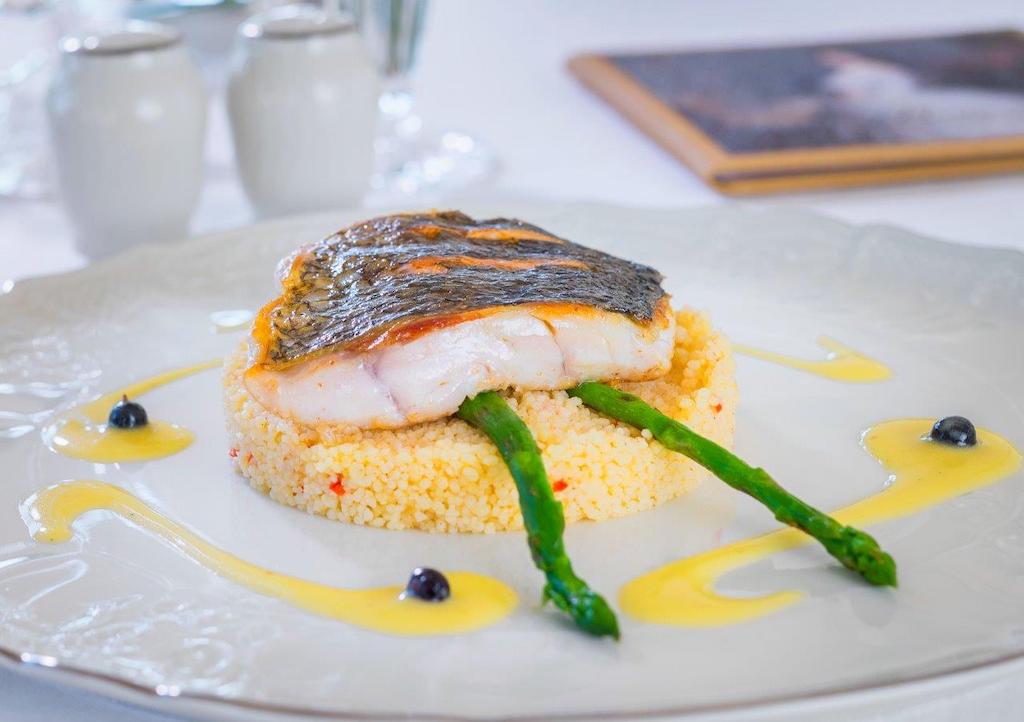
Val Marina
This renowned marina-front terrace is situated directly on the promenade and allows guests to enjoy picturesque views of the old town of Hvar, the Arsenal, and the harbor. Perfectly balancing space and privacy, it is the ideal spot for a romantic dinner. Pair fantastic international and unique Hvar wines from some of the finest local and world-renowned producers with your exquisite culinary experience. This is surely one of the top places where to eat in Hvar.

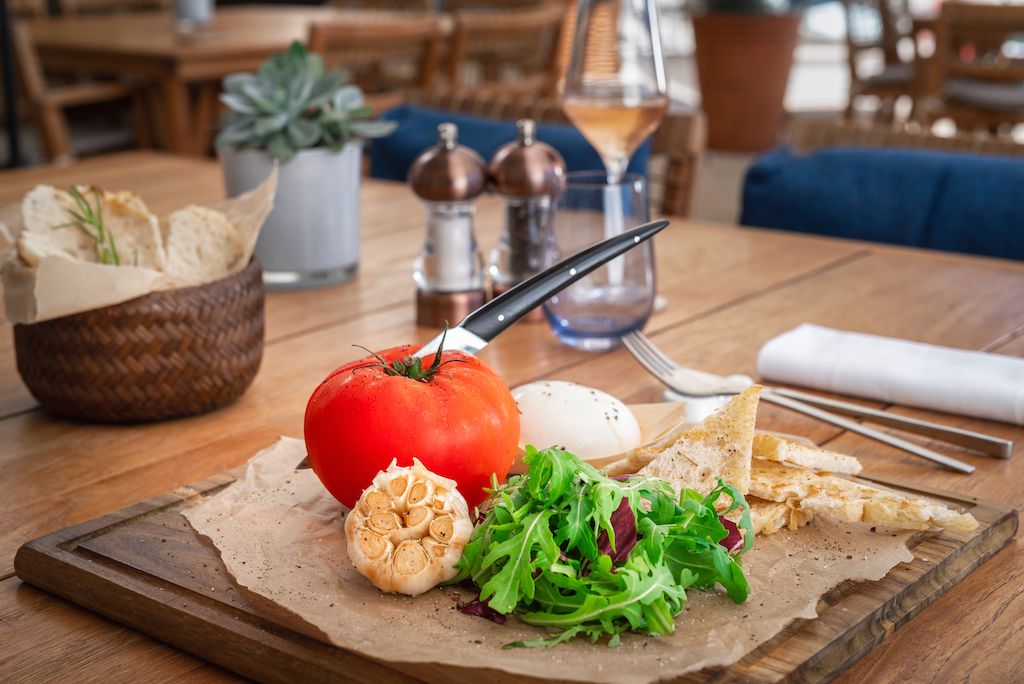
Top Bar
Located on the roof-top of spa hotel Adriana, Top Bar is one of the places that will simply leave you in awe. Soak up the atmosphere and enjoy stunning panoramic views spanning from the fortress all the way to Paklinski islands. Enjoy different Mediterranean tastes with a twist of Asian-inspired cuisine. Later, mingle with friends and enjoy tasty cocktails or a bottle of wine accompanied by chill lounge music.


BB Club Social Bar & Kitchen
Still thinking about where to eat in Hvar? BB Club Social Bar & Kitchen is Hvar’s newest restaurant and bar concept. Not to mention that this restaurant in Hvar is located in the heart of the city, directly in the marina. Perfect for mega-yacht gazing, BB’s lavish terrace is also the ideal place to enjoy Mediterranean delicacies with an emphasis on local ingredients.



For more info click here.
For more on where to eat in Croatia, make sure to check out our dedicated lifestyle section.
Five New Croatia Airlines Split Seasonal Flights Running in June
June 11, 2022 - New Croatia Airlines Split seasonal routes were launched on Friday. The national airline will directly connect Split with five new European destinations during this year's summer flight schedule - Stockholm, Bucharest, Dublin, Milan, and Amsterdam.
The ceremony, which marked this year's expansion of the Croatia Airlines destination network from Split, was held after the first seasonal flight from Stockholm landed in Split. Currently, passengers have two flights a week on this international route - Fridays and Sundays, and return airline tickets are available for as little as 129 euros, reports Croatian Aviation.
On Friday around 2 pm, the first passengers on the new Split - Bucharest seasonal line, which will operate on Wednesdays and Fridays, took off on Croatia Airlines, and return airline tickets are available to passengers for as little as 149 euros.
"We are glad that we have offered passengers an even better travel choice and expanded our European destinations network. During this year's season, we plan to connect Croatia with 21 international destinations, i.e., 22 European airports, and the aircraft will fly on 41 international routes. In that period, we plan to run more than 16,000 flights and offer about 1,766,000 seats, which will make the national airline contribute to the quality of Croatian tourism products and improve the transport infrastructure of the Republic of Croatia," said Slaven Zabo, commercial director of Croatia Airlines.
"Croatia Airlines is the most important business partner of Split Airport. This has been particularly evident during the last two crisis pandemic years. Even during the complete blockade of air traffic, Croatia Airlines ensured the connection of Split Airport with the world. Also important to us is the connection that Croatia Airlines provides throughout the year, especially during the winter flight schedule. Direct connection with 18 European destinations compared to 13 in the record 2019, when the Airport had 3.3 million passengers, proves the fact that Croatia Airlines is a strong lever in the process of recovering air traffic and tourism in this region," said Pero Bilas, Assistant Director-General of Split Airport.
On Sunday, June 12, Croatia Airlines is starting to directly connect Split with two other European capitals - Dublin and Milan. There will be flights between Split and Dublin on Tuesdays, Thursdays, and Sundays, and return tickets are available from 169 euros, while flights between Split and Milan are planned on Thursdays and Sundays, and passengers on this route have return tickets from 119 euros.
The fifth new line this season from Split will be introduced on June 14 this year, when the first Split - Amsterdam flight will run. Flights on this route are planned for Tuesday, and return tickets are available to passengers for as little as 159 euros.
During this season, Croatia Airlines planes will directly connect Split with 18 European destinations. In addition to the new seasonal lines to Stockholm, Bucharest, Dublin, Milan, and Amsterdam, Split will be directly connected with Athens, Vienna, Berlin, Düsseldorf, Frankfurt, Copenhagen, London (ZL Heathrow and ZL Gatwick), Lyon, Munich, Paris, Rome, and Zurich. In addition, flights on the Split - Prague season line, which was first introduced last year, are being renewed.
For more on flights to Croatia and other travel announcements, check out our dedicated travel section.
Cibona Zagreb are Croatian Basketball Champions 2021/22 (PHOTOS)
June 10, 2022 - A 56:51 (38:25) victory at home for Cibona in Game 5 brings the decision against KK Zadar. The attending media representatives elected Roko Prkačin as MVP.
Confidence was already high for the 5000 spectators at Dražen Petrović Basketball Center in Zagreb before the game began. In the previous 12 finals played by Cibona and Zadar in the Croatian championships, the people of Zagreb had celebrated 11 times. This year both teams had managed to win one away game and one home game during the first four games to reach this decisive game 5.
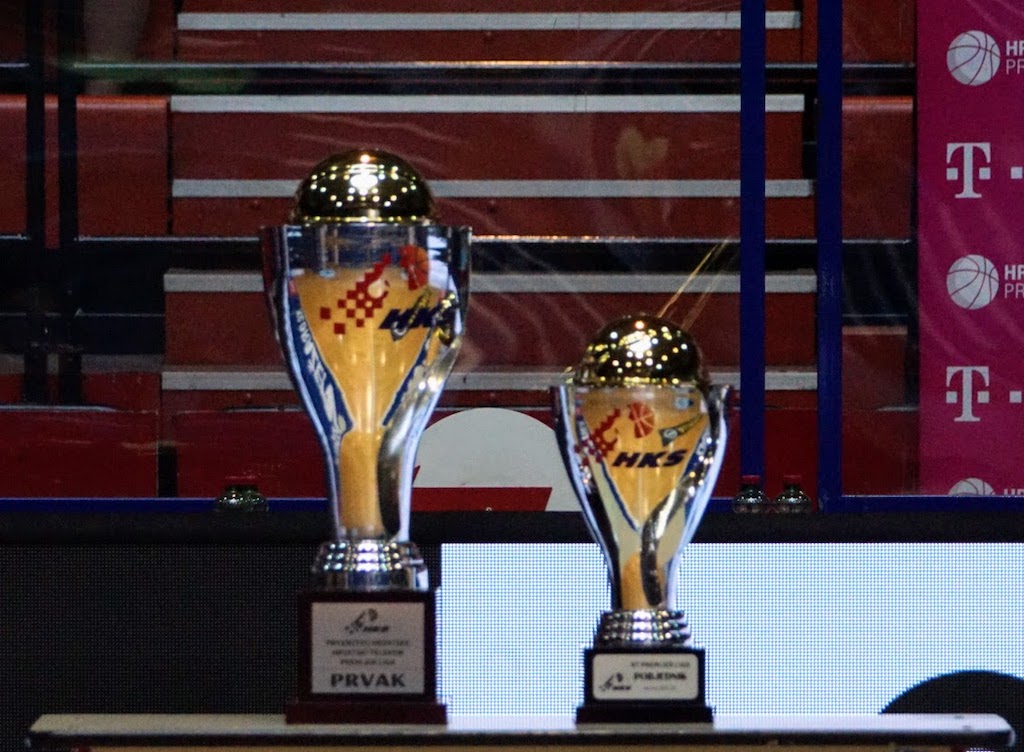 Despite the great support from the fans, the home team seemed to be absent at the beginning. Zadar only needed 2 minutes to acquire a 0:8 lead before Cibona was able to respond with multiple three point shots. At the other end of the court Okorn Gašper’s youngsters also started to show a better defense to turn the game around by the end of the first quarter (18:16).
Despite the great support from the fans, the home team seemed to be absent at the beginning. Zadar only needed 2 minutes to acquire a 0:8 lead before Cibona was able to respond with multiple three point shots. At the other end of the court Okorn Gašper’s youngsters also started to show a better defense to turn the game around by the end of the first quarter (18:16).
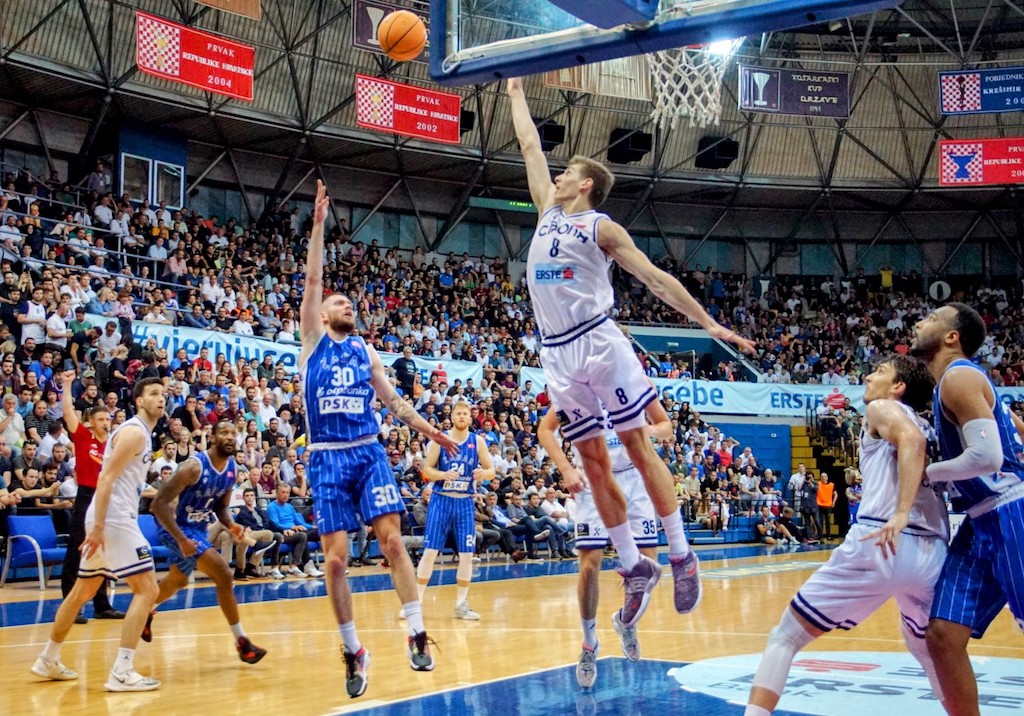
With 10 points from MVP Roko Prkačin in the second quarter, Cibona managed to pass by the guests. Srđan Hellbich’s men could not find an answer for the young Cibona team’s intensive defense and accurate outside scoring. For many, the game already seemed decided by half-time (38:25).
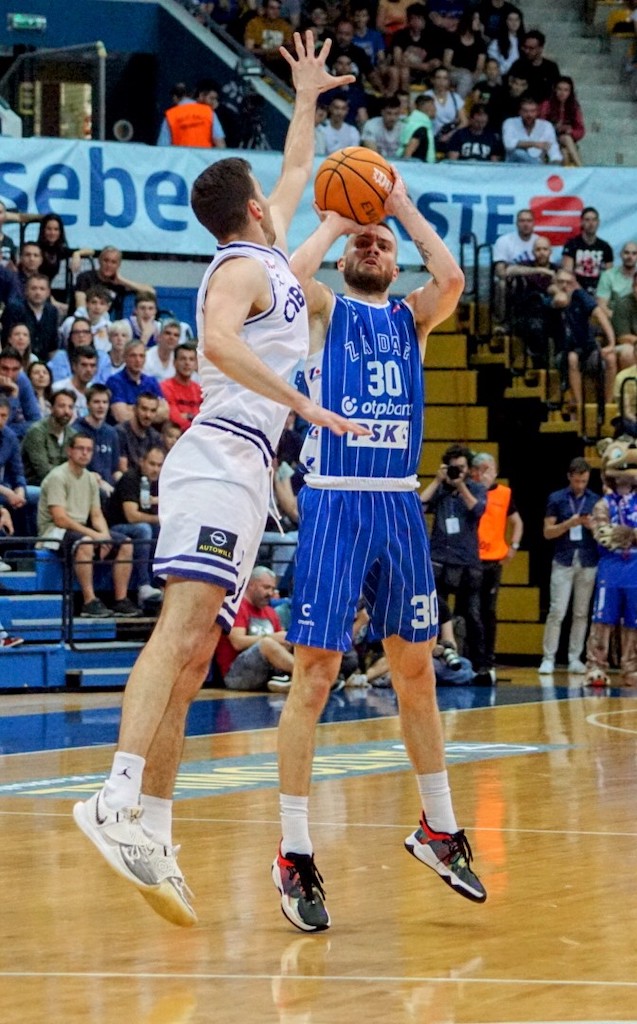
Defending champions Zadar did not give the game up yet however. With the support of their 500 noisy fans, they managed to hold Cibona to only 8 points in the third quarter while scoring 12 themselves to make it 46:37 before the start of the final quarter. The guests even had a chance to turn the game around within the final minute. Home court advantage meant that two critical decisions were given to Cibona. The second one was a foul called against Zadar’s Thompson who fouled out and had to watch the hosts winning the game despite being outscored in the fourth quarter as well.
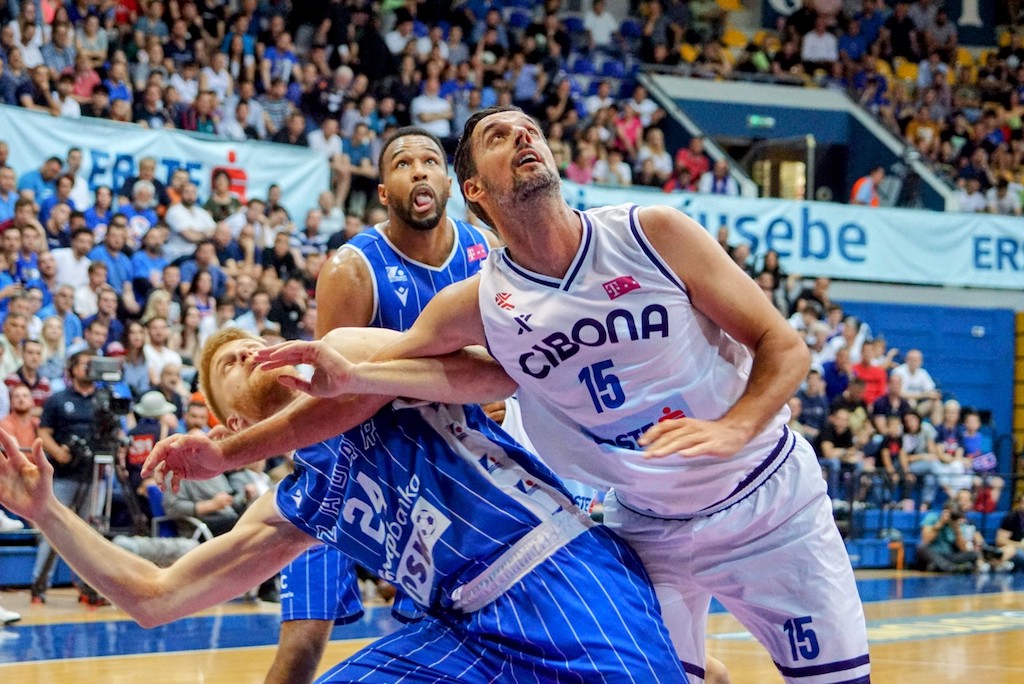
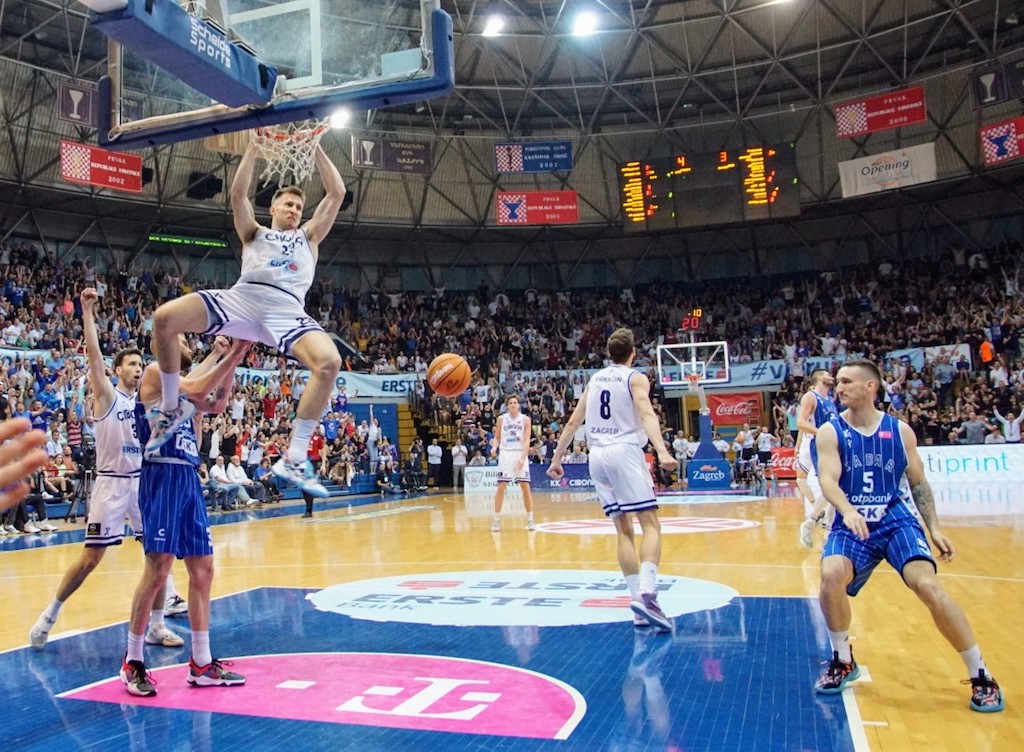
Cibona’s top scorers were Toni Nakić with 15 and Roko Prkačin with 14 points. Zadar’s captain Dominik Mavra (13) and his team-mate Trevor Thompson (12) scored best for the guests who couldn't beat the odds and congratulated Cibona Zagreb on their 20th title.
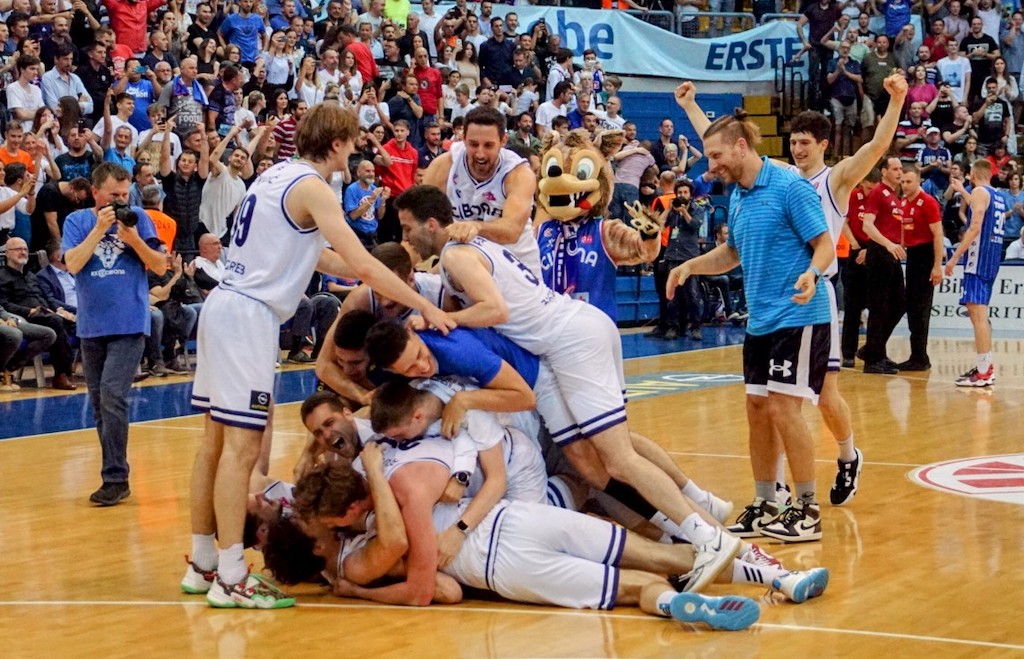

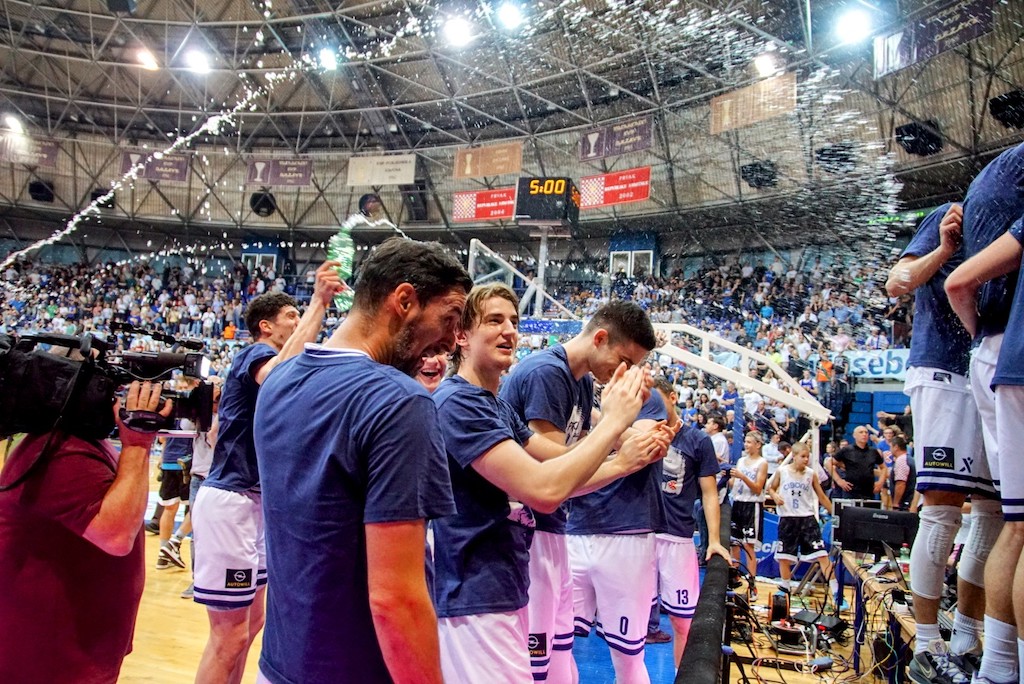
Referees: Hordov Tomislav, Jovović Alfred, Jurčević Josip
Box score: https://fibalivestats.dcd.shared.geniussports.com/u/HKS/2097393/
Result by quarters: 18:16, 20:9, 8:12, 10:14
To read more about sport in Croatia, follow TCN’s dedicated page.
Croatia Beat Denmark (0:1), Adds First Three Points in UEFA Nations League!
June 10, 2022 - In their third match in the UEFA Nations League, Croatia beat Denmark in Copenhagen with a goal from Mario Pašalić and took their first three points, which now places them third in the table with 4 points, tied with Austria!
In the third fixture of group A, Croatia visited Denmark in Copenhagen hoping to get their first three points after losing to Austria in Osijek (0:3) and drawing against France in Split (1:1). The coach of the Croatia national team, Zlatko Dalić, has prepared a starting eleven with quite a few changes compared to the two previous games. The last time the two teams faced each other was at the 2018 FIFA World Cup in Russia, where both drew 1:1 at the end of 120 minutes. Croatia won the match by penalties.
Croatia's starting eleven to face Denmark: Dominik Livaković; Šime Vrsaljko, Martin Erlić, Josip Šutalo, Josip Juranović; Kristijan Jakić, Marcelo Brozović, Luka Ivanušec, Mario Pašalić, Mislav Oršić; Andrej Kramarić.
Denmark starting eleven: Kasper Schmeichel; Daniel Wass, Joachim Andersen, Andreas Christensen, Joakim Maehle; Pierre Emile Hojbjerg, Thomas Delaney, Christian Eriksen; Andreas Olsen, Andreas Cornelius, Mikkel Damsgaard.
Match summary:
Denmark was superior to Croatia in the first half. There was not a big difference in possession of the ball between the two teams, but the Danish offense created more danger in the first 45 minutes. It is worth noting the great defensive work of the two center backs Josip Šutalo, who made his debut today, and Martin Erlić. Both the Croatian midfield and offense couldn't find a way to create much danger in the Danish area.
In the second half, the presence of Luka Modrić and Mateo Kovačić brought more ideas to the Croatian team, who were able to control the ball more calmly and therefore began to find ways to create clearer scoring chances. Finally, a goal from Mario Pašalić in the 69th minute would give Croatia victory and their first victory in the UEFA Nations League, curiously, after adding only one point from their two home games. Croatia climbs to third place in the table tied on points (4) with Austria. Despite the defeat, Denmark remains in the lead with 6 points.
Match highlights:
The first 5 minutes of the match were of shared possession between both teams. In the 6th minute, Cornelius took advantage of a poor clearance by the Croatian defense for Denmark's first attempt on goal, but his shot went high.
In the 8th minute of the match, Cornelius received a yellow card for dangerously contesting a ball with Croatian goalkeeper Livaković, who had to be treated by the doctors for a long time.
In the 11th minute, Joakim Maehle was left one on one with Livaković after a very good collective play. However, his shot went wide for the Croatian goal.
The first goal attempt for Croatia came from Dinamo Zagreb midfielder Mislav Oršić in the 13th minute, who tried to finish off a good Croatian counterattack, but his shot went high.
In the 40th minute, Cornelius again found a great opportunity to score after an error by Kristijan Jakić. The Danish forward put the ball to Livaković's right post, but the Croatian goalkeeper responded with a great save.
Three minutes later, the referee disallowed a goal by Cornelius, after a foul by Maehle on Vršaljko when they were contesting for the ball inside the Croatian box.
The referee added 2 more minutes to the first half, and both teams went into the break tied 0:0. Possession at the end of the first half was 54% for Denmark and 46% for Croatia.
After the break, Dalić brought in three players. Josip Stanišić replaced Šime Vrsaljko, Mateo Kovačić replaced Kristijan Jakić, while Luka Ivanušec left the field for Luka Modrić
Luka Modrić, after a great individual play inside the Danish area in the 56th minute, crossed the ball into the small area but none of his teammates could convert the chance.
In the 58th minute, Mislav Oršić was replaced by Nikola Vlašić.
In the 60th minute, Andrej Kramarić had a great opportunity to convert Croatia's first goal, with a powerful first-touch kick inside the box, but Kasper Schmeichel made an amazing save. However, the referee invalidated the play due to a previous offside.
In the 61st minute, the Danish team made its first three substitutions of the match, all at once. Rasmus Kristensen came on for Daniel Wass, Jonas Wind for Andreas Cornelius, and Martin Braithwaite for right-winger Mikkel Damsgaard.
In the 63rd minute, Luka Modrić found a space to shoot outside the box, but goalkeeper Schmeichel had no problem stopping his attempt.
In the 67th minute, Danish defender Joachim Andersen received his team's second yellow card after a violent tackle on Andrej Kramarić. It could have been a red card.
A free throw was awarded after the foul. Luka Modrić put the ball into the box, and a clear attempt by Stanišić was deflected by a Danish defender.
The first goal of the match came for Croatia on the following corner kick in the 69th minute. Luka Modrić played short and found Brozović, who put a dangerous cross into the area that was first headed by Kramarić, and Mario Pašalić would find the ball at his feet to score Croatia's first goal.
In the 75th minute, Stanišić would receive the first yellow card for Croatia as he attempted to stop Martin Braithwaite.
Christian Eriksen took the free-kick into the box but Braithwaite sent it well past Livaković's goal.
In the 77th minute, Andrej Kramarić was replaced by Ante Budimir in a tactical substitution.
In the 82nd minute, Martin Braithwaite again missed a great opportunity for Denmark.
In the 83rd minute, Yussuf Poulsen came on to replace Andreas Olsen in the Danish team.
Three minutes later, after a great collective play, Marcelo Brozović found an opportunity to kick the ball outside the Danish box, but his shot went close to Schmeichel's right post. The referee booked Ante Budimir for a foul on that play. It was the second yellow card for Croatia.
A minute later, in the 87th minute, the Danish team found the equalizer after a tangled play in the Croatian area, but the goal was disallowed for offside.
In the 90th minute, Yussuf Poulsen, who barely played ten minutes, was replaced by Robert Skov due to injury.
The referee added 5 more minutes to the match.
Brozović would have one more try in the 94th minute, but his shot went high. The referee ended the match in the 95th minute and Croatia took their first three UEFA Nations League points away from home.
Croatia will play France in Paris on June 13th.
For more, make sure to check out our dedicated sports section.
Fire Protection System, 22,000 Firefighters Ready For Fire Season
ZAGREB, 10 June 2022 - Croatia's fire protection system is ready for the coming fire season, and more than 22,000 firefighters across the country are equipped and ready to respond at any time, it was said at the Firefighter Operations Command in Divulje outside Split on Friday.
A firefighting exercise, testing the abilities of firefighters for the coming wildfire season, was held at Divulje, and the event was also attended by Prime Minister Andrej Plenković.
He said that Croatia has fire forces also for operations in extreme weather conditions and is helping other countries as well, mentioning in that context assistance provided last year to Bosnia and Herzegovina, Turkey and Greece as well as a few months ago to Slovenia.
"Those are examples of our homeland security system and of a wish to contribute to fire prevention, not only at home but elsewhere as well," he said.
Chief Fire Commander Slavko Tucaković said that the Firefighter Operations Command in Divulje would start operating on 13 June while on 23 June firefighters would move from the mainland to the coastal area and islands to help local residents and tourists feel safe in the event of fires.
For more, check out our politics section.
Croatian Companies Can Get Involved In Solving Chip Shortage
ZAGREB, 10 June 2022- The Ministry of Economy and Sustainable Development has invited Croatian companies to express interest in microelectronics projects and to be engaged in solving the problem of chip shortages and reducing dependence on imports from Asia, the Croatian Chamber of Commerce (HGK) said on Friday.
HGK and its Microelectronics and Semiconductors Group initiated the inclusion of Croatian companies in the European IPCE program (Important Projects of Common European Interest), which was achieved in coordination with the Permanent Representation in the EU and the Ministry of Economy and Sustainable Development.
According to HGK, Croatian companies are also contributing to the efforts to address the issue of chip shortages and reducing dependence on imports from Asia through the implementation of the EU Industrial Strategy.
The call for expressions of interest for microelectronics projects is open until 8 July and includes the design, development and production of processes, chips, semiconductor substrates and related technologies.
HGK recalled that it is rare today that a device does not include chips, so for example there are 50 to 150 chips in an average car, and as their production was halted with the closing down of plants due to the pandemic, a shortage in chips occurred.
At the same time, the demand for all types of electronic devices has increased worldwide, and with the reopening of plants, many industries have faced a shortage of chips.
A possible solution for this is to develop a new generation of microelectronics, but also to return and boost production in Europe, HGK said.
"An opportunity for Croatian companies exists within the IPCEI and in new types of design and the use of new types of advanced materials. These are significant tools that can help keep Europe from lagging behind Asia and the United States in this segment," said the president of the microelectronics and semi-conductors group within HGK, Srđan Kovačević.
Kovačević of the Orqa company said that the company had recently concluded a cooperation agreement with the faculties of electrical engineering and computing in Osijek and Zagreb on the design of a specialised chip for unmanned systems.
One of the foundations to resolve problems in chip supply chains is the Chips Act, and the Croatian Chamber of Commerce is the contact point for it.
HGK added that in 2020 Croatia was among the first signatories of the declaration on processors and semiconductor technologies, which calls for investments of around €145 billion in boosting the development of the European microelectronics and semiconductor sector in the next two to three years, which is 20% of the European Recovery and Resilience Program.
For more, check out our business section.
4 In 5 Companies Would Pick Croatia Again As Business And Investment Destination
ZAGREB, 10 June 2022 - A survey by the German-Croatian Chamber of Industry and Commerce (AHK) shows that over 80% of the companies are ready to pick again Croatia as a business and investment destination.
The survey, conducted by the AHK from 25 February to 26 April in 16 central and eastern European countries, shows that the biggest challenges for entrepreneurs are high energy prices and a lack of skilled labour force.
The poll covered a total of 983 companies, including 105 local and foreign companies in Croatia.
Presenting the findings of this year's survey, AHK Chamber president Thomas Sicla said that "a high number of companies, that is 84%, would again choose Croatia as a destination for their investments."
The findings of the survey for 2021 showed that that 74% companies would pick Croatia again as a business and investment destination.
Every other respondent describes Croatia's economic situation as satisfactory
More than a half of the respondents in this year's survey, that is 53% of them, see the economic situation in Croatia as satisfactory, which is a 10% rise compared to the previous survey.
Furthermore, 21% described the situation as good.
One in three respondents says economy has improved
Also a third of those polled believe that the economy in Croatia has improved since last year.
Concerning the perception of the economic developments, in other countries covered by the survey a similar number of respondents as in Croatia find the economic situation to be good.
Nearly 97% of entrepreneurs optimistic
The lion's share of the business people polled in this survey (97%) are optimistic about the prospects for doing business.
More than a half of the respondents believe that there will be improvements in their businesses, and a mere 10% are afraid of deterioration.
As for the short-term repercussions of the war in Ukraine, 80% of the respondents point to growing energy and raw material prices, and 56% point to disruptions in supply chains.
One in five respondents is afraid of losing business partners.
Asked when they expect the normalisation of the situation in the supply chains, 45% say they expect it in 2023, while 20% do not believe that it could be achieved in the foreseeable period.
Croatia's advantages and disadvantages
Croatia's EU membership, adequacy of tertiary education, skilled workers, infrastructure and productivity and motivation of employees are cited as the five advantages of Croatia.
The country's disadvantages and challenges are insufficient struggle against corruption, tax burden, non-transparent public procurement and the public administration.
The performance of the current government was assessed as satisfactory by 35% of the respondents and as bad by nearly 40%.
For more, check out our business section.


